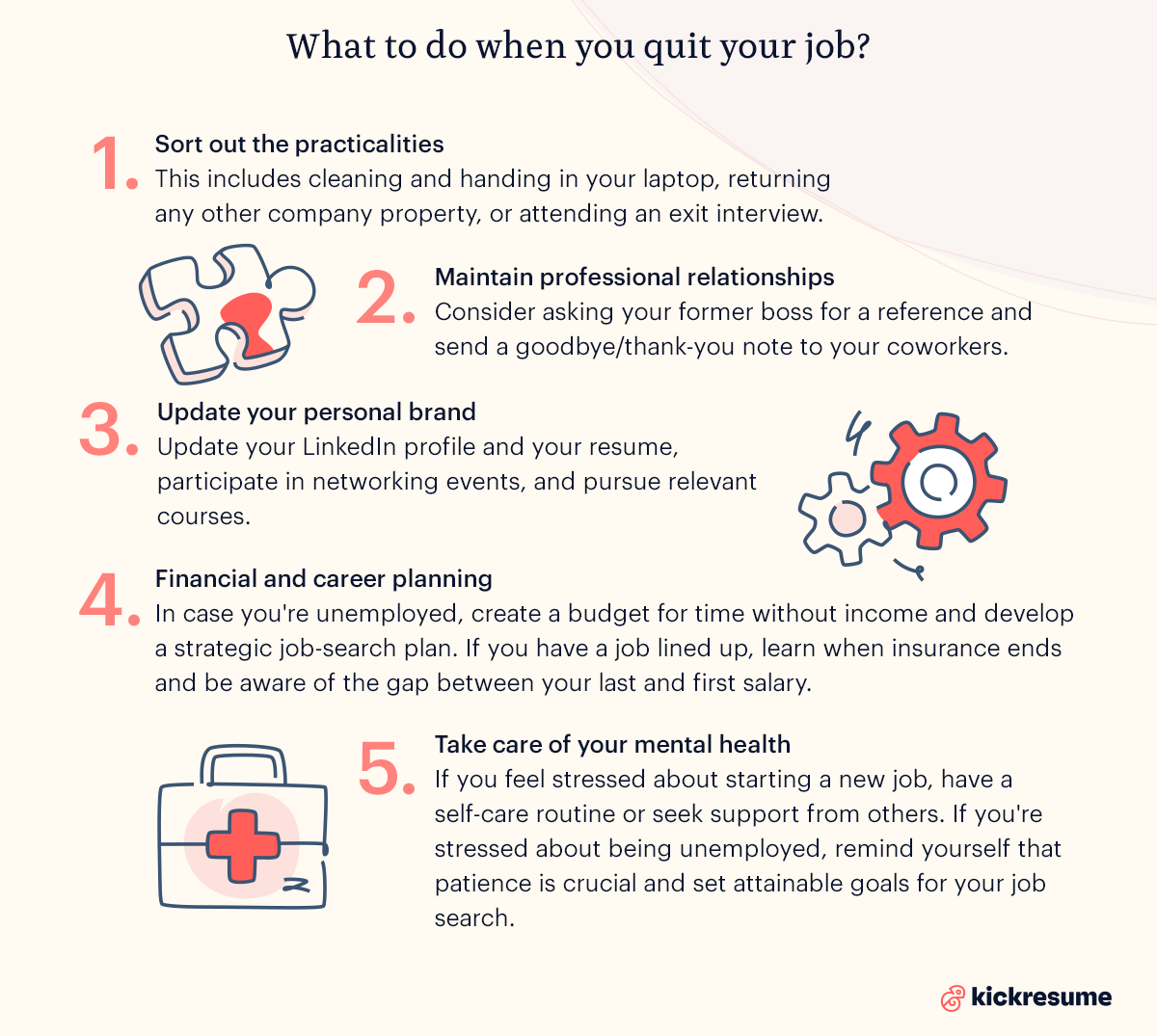Deciding to quit your job can be an overwhelming and challenging decision; however, the work doesn't end once you've submitted your resignation.
Now, the focus should shift to figuring out what to do when you quit your job.
Here are five fundamental steps to follow after quitting a job:
- Sorting out the practicalities
- Maintaining professional relationships
- Updating your personal brand
- Financial and career planning
- Taking care of your mental health
Whether you already have a new position lined up or are still searching for new opportunities, this article provides guidance for navigating life after you quit.
What to do when you quit your job: a 5-step guide
Okay, you already gave your two-week notice and submitted a formal resignation letter. You officially quit.
Now what?
Here's what you need to do after quitting:
1. Sort out the practicalities
Sorting out the practicalities lets you avoid facing any awkward situations and depart from your job with the essential loose ends tied up.
So, sort out these practical aspects of leaving your job:
- Clear your computer and return company property. Before you walk out the door for the last time, make sure to clear your computer of personal files and information, as well as uninstall any personal software or apps. Don't forget to turn in your computer, access cards, keys, and any other company property to the responsible person.
- Organize a professional handover of tasks. Take the time to go through your work materials, such as files, notes, and contacts, and organize them in a way that will be easy for your replacement to understand and use. Create a brief but detailed guide outlining your tasks and responsibilities, alongside any helpful tips or shortcuts you've discovered during your time in your role.
- Attend an exit interview. You might be asked to attend an exit interview with your manager and HR rep. Here, discuss your work experience, offer feedback, and clarify any pending tasks or expectations to avoid misunderstandings.
- Offer to help with onboarding. And, of course, you should also offer assistance to your team during the transition. It's common to help with onboarding of your successor, training team members on specific tasks, etc.
This will not only ease the transition for the team but will also leave a positive lasting impression on your colleagues. Which brings us to the next point.
2. Maintain professional relationships
Leaving a job doesn't mean you have to leave behind the professional connections you've made during your time there.
By respecting and nourishing these relationships, you can continue to cultivate a strong and diverse network that may benefit you in the future.
Here's how to maintain those professional connections as you move forward:
- Ask for recommendations/references. Whether you already have a job lined up or are just beginning your search, asking for a reference is always beneficial. You can ask your former boss, manager, or colleague. Approach them professionally, in person or via a phone call, and give them enough time to consider your request. Be ready to bring up examples of your teamwork, share your updated resume and a list of your accomplishments to ease the reference-writing process.
- Send a goodbye email to your colleagues. A simple yet thoughtful thank-you/goodbye email to coworkers or any staff who've supported you can leave a lasting impression. Expressing gratitude for the experiences and relationships you've formed shows your appreciation and keeps those connections alive. Make sure to include your personal contact details in the note so people can easily reach out to you in the future.
Here's an example of a short and sweet email to your coworkers:
Subject: Thank you and goodbye
Hi all,
As you might have already heard, I am leaving my position at [Company name], and my last day will be [last working day]. I wanted to take a moment to reach out and say goodbye, as well as express my gratitude for the time spent here. It has been an absolute pleasure working with you, and I am grateful for the experience and all the support.
To celebrate our time together and bid farewell, I would like to invite you all to a small goodbye party on [date] at [time] in the [office location].
In the future, I'd love to stay connected with you all. Please feel free to reach out to me at [your personal email address] or connect with me on LinkedIn [your LinkedIn profile URL]. Regarding my current work tasks, [Name of the colleague] will be taking over them, so please, from now on, turn to her.
Once more, thank you for everything, and I wish you all the best!
Warm regards,
[Your name]
Now that you've set the stage for maintaining these valuable relationships, it's time to focus on showcasing the best version of yourself for those new opportunities.

3. Update your personal brand
As you embark on new career adventures, your personal brand becomes your unique selling point, showcasing your skills, experience, and values.
Here's how to refine your personal brand for upcoming opportunities:
- Update your LinkedIn profile. Ensure your LinkedIn profile is up-to-date and includes a professional profile picture, a strong LinkedIn summary, a comprehensive work history, and new recommendations. You can even turn your LinkedIn profile into a great resume with just one click.
- Update your resume. An updated resume is crucial to showcase your recent experience and skills to potential employers. Tailor your resume to highlight the most relevant aspects for each position you apply for, and craft a cover letter to accompany it.
- Attend networking events and establish connections. Participate in networking events, workshops, or conferences in your industry to create new connections and strengthen existing relationships. Have some networking pickup lines ready to introduce yourself effectively. Search for industry-specific conferences, workshops, and socials on platforms such as Eventbrite, LinkedIn, and Meetup.
- Enhance your skills through further education or training. Identify areas for improvement and pursue relevant courses to demonstrate your commitment to professional growth, making you more attractive to potential employers. Browse trustworthy online course sites, such as Coursera or EdX.
With your personal brand polished and ready to impress, it's now time to tackle your financial situation and set strategic career goals.
4. Financial and career planning
Transitioning from one job to another often comes with financial and professional challenges that can create uncertainty. If that's your case, by planning carefully, you can minimize potential setbacks.
Here are strategies to consider for financial planning:
- Understand when insurance benefits end. After quitting a job, when does insurance end? Most job-sponsored health insurance ends the day you stop working or at the end of the month in which you work your last day. Losing insurance coverage can be a significant concern after quitting a job. Make sure to explore alternative options to maintain protection during your transition period.
- Be aware of the gap between your last and first salary. Your first salary in a new job will likely be received after a month or more from your start date, depending on the company's pay schedule. Hence, it's crucial to budget accordingly and have sufficient savings to cover your rent, bills, etc.
Additionally, people who haven't found a new job yet, should:
- Create a budget to adjust for time without income. When you quit your job, it's essential to reevaluate your financial situation. Identify your necessary expenses and eliminate any non-essential costs. Building an emergency savings fund can also help cushion the financial impact during your job search.
- Develop a strategic job-search plan. Use job boards, make networking connections, use social media platforms, or recruitment agencies. By organizing your job search, setting specific targets, and tracking your progress, you'll optimize your chances of finding the right opportunity in a timely manner.
With financial planning and a job-search strategy in place, it's time to also keep your mental health in check after you quit your job.
5. Take care of your mental health during this time
Quitting a job can be challenging. Both for people who have a new job lined up and for those facing a period of unemployment.
Here's how to approach the stress of starting a new job:
- Establish a daily self-care routine. Set aside time each day for activities that help you relax and de-stress, such as meditation, exercise, journaling, or engaging in hobbies you enjoy. Maintaining a routine can provide stability and help you manage anxiety surrounding the new job.
- Seek support from others. Share your feelings and concerns with friends, family, or a mental health professional, who can offer guidance, encouragement, and coping strategies to alleviate stress as you transition into your new role. Remember, you don't have to face this stress alone.
And, if you don't have a new job lined up yet, this is how to stay productive and make the most of this time:
- Utilize free time effectively. Take up activities that contribute to your growth, such as volunteering, attending workshops, or learning new skills relevant to your field. By doing so, you'll stay focused, productive, and prepared for your next opportunity.
- Recognize that job searching may take time. In case you have no job lined up yet, recognize that searching for a job can be a lengthy process. Stay positive, be persistent, and remind yourself that patience is crucial in these situations. Instead of feeling discouraged, reassess your approach or take breaks when necessary to maintain your motivation.
- Boost your confidence after quitting a job. Quitting a job can impact your self-confidence, but there are ways to regain it. Focus on your achievements, strengths, and the skills you've acquired throughout your career. Set attainable goals for your job search and celebrate small accomplishments along the way to keep your confidence up.
Key takeaways: What to do when you quit your job?
Quitting a job can be a daunting experience. However, following these 5 steps on what to do when you quit your job will help you successfully navigate the transition to new opportunities.
After all, everyone needs a bit of guidance sometimes.
As a recap, focus on:
- sorting out practicalities like returning your computer, other company property, and preparing for an exit interview;
- maintaining professional connections by asking for a reference from your ex-boss or coworker, and sending an amicable goodbye email;
- updating your personal brand by refreshing your resume, LinkedIn profile, and attending networking events;
- planning your financing in case you remain unemployed or your first salary from a new job comes later than your bills;
- taking care of your mental health if you feel stressed about starting a new job or about being unemployed.
And confidently pursue your next career adventure.

![How to Write a Professional Resume Summary? [+Examples]](https://d2xe0iugdha6pz.cloudfront.net/article-small-images/i-Profile.svg)
![How to Put Your Education on a Resume? [+Examples]](https://d2xe0iugdha6pz.cloudfront.net/article-small-images/i-Collage-Universities.svg)
![How to Describe Your Work Experience on a Resume? [+Examples]](https://d2xe0iugdha6pz.cloudfront.net/article-small-images/Experience.svg)


